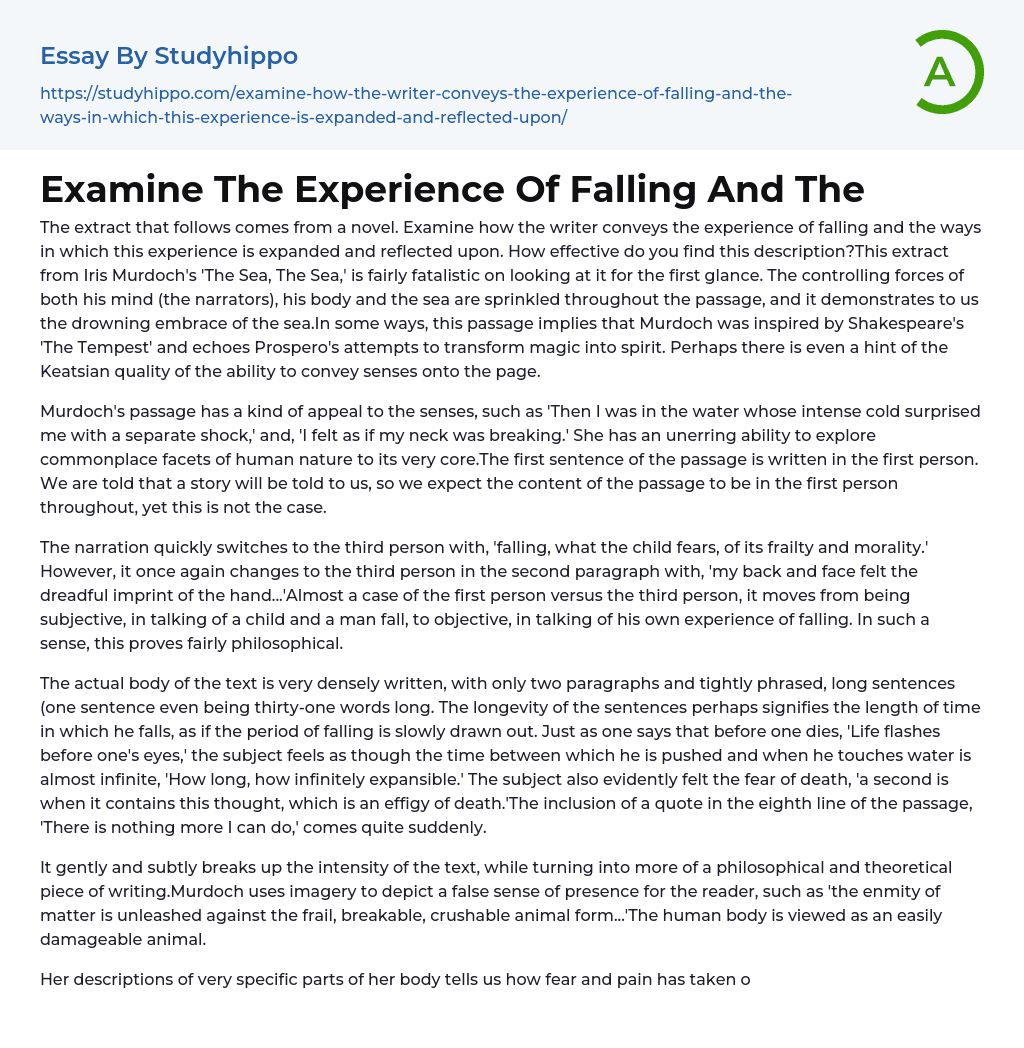The following extract is from a novel and explores the writer's depiction of falling and how this experience is expanded and reflected upon. The description, taken from Iris Murdoch's 'The Sea, The Sea,' initially appears fatalistic with references to the controlling forces of the narrator's mind, body and the sea. However, it ultimately portrays the drowning embrace of the sea, seeming to draw inspiration from Shakespeare's 'The Tempest' with echoes of Prospero's transformation of magic into spirit. Additionally, there may even be a suggestion of Keatsian qualities in conveying sensory experiences through literature.
Murdoch's writing uses sensory language to engage the reader, as seen in phrases like "Then I was in the water whose intense cold surprised me with a separate shock," and "I felt as if my neck was breaking." Additionally, she skillfully delves into the fu
...ndamental aspects of human nature. The initial sentence of the passage is presented from a first-person perspective, leading us to anticipate that the rest will be written in this way. However, this is not actually the case.
The text transitions between perspectives multiple times. Initially, it describes the child's fear of falling and vulnerability, using the third person perspective. Later, the narrator switches to first person, recounting their own experience of falling and being injured. This shift from subjective to objective is quite philosophical in nature.
The text's body is written with dense two paragraphs, which have tightly phrased and long sentences, some of them being thirty-one words long. The longevity of these sentences might resemble the length of time in which the subject falls, as if the period of falling is extensively drawn out. During thi
period of time, the subject experiences a feeling of endlessness as they're falling towards the water, and they fear death, as a second containing this thought is an effigy of death. The passage includes a quote that appears unexpectedly in line eight: "There is nothing more I can do."
By using imagery, Murdoch portrays the human body as a vulnerable and easily damaged animal, creating a false sense of presence and transforming the text into a philosophical and theoretical work.
Through her detailed descriptions of certain areas of her anatomy, it becomes clear that fear and anguish have overwhelmed her form. A prime example can be seen in the statement, "My back and waist felt the dreadful imprint..." coupled with "My hands reached out in vain."
My feet spasmed weakly and uselessly, causing a sudden jerk.
Murdoch's writing employs both visual descriptions and repetitive language to convey emotions and sensations. For instance, in the opening paragraph, she repeats phrases like 'how long it was, how terrible, how hopeless' to help the reader connect with the narrator's sentiments. The paragraph concludes with the line 'Hard mineral gravitational scene.'
The first paragraph depicts the narrator's observation, while the second paragraph concludes with rock imagery, implying harm. As the narrator plunges into the water, the shock impels his body to right itself, but he realizes that the whirlpool is unsuitable for swimming. Furthermore, the second instance portrays how the scene turns into a hazardous situation when the narrator's head hits a smooth rock.
Murdoch implies that the impact of hitting the water creates an otherworldly sensation, describing it as a dome of dark, translucent green with waves above. The narrator expresses a
lack of control over their body, describing it as flailing senselessly amidst a maelstrom of dismembering forces. The use of "maelstrom" is a metaphor for the tangled mess of the narrator's body and their mental confusion. The suddenness of the final sentence conveys the unexpectedness of hitting the rock, which is described as a violent strike against a seemingly smooth surface, creating an oxymoron.
Iris Murdoch's portrayal of falling effectively immerses the reader in both the psychological and physical sensations of fear. With her vivid description, she invites the reader into the inner world of the faller, offering a glimpse into their thoughts and emotions.
- Improve essays
- Awareness essays
- Trust essays
- Farewell essays
- Visit essays
- Accident essays
- Driving essays
- Volunteering essays
- Excellence essays
- Knowledge essays
- Ignorance essays
- Growing Up essays
- Mistake essays
- Failure essays
- Peace Corps essays
- Expectations essays
- Luck essays
- Challenges essays
- Decision essays
- Sacrifices essays
- Struggle essays
- Vacation essays
- Memories essays
- Event essays
- Gift essays
- Party essays
- Incident essays
- Flight essays
- Obstacles essays
- Problems essays
- Success essays
- Personal Experience essays
- Overcoming Challenges essays
- Benefits of Volunteering essays
- Childhood Memories essays
- Car Accident essays
- Driver essays
- Driving under the Influence essays
- Volunteer Experience essays
- Nightclub essays
- Unconscious Mind essays
- Common sense essays
- Adaptation essays
- Adventure essays
- Adversity essays
- Aging essays
- Alcohol essays
- Barbie Doll essays
- Beauty essays
- Care essays




